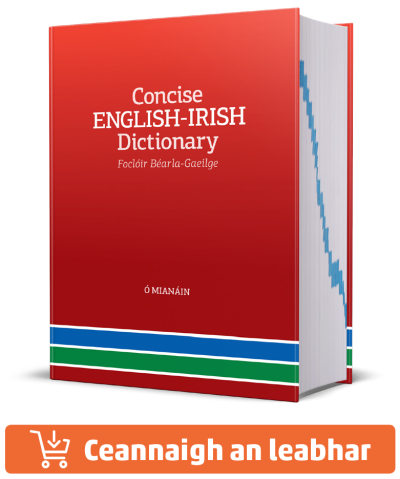Foclóir Gaeilge–Béarla
Ó Dónaill, 1977
An Foclóir Beag
Ó Dónaill & Ua Maoileoin, 1991
English–Irish Dictionary
de Bhaldraithe, 1959
Gramadach
Foghraíocht
réchaladh
réchas
réchnocach
réchóip
réchonn
réchosach
réchúiseach
rédhánta
rédhearg
rédhorcha
rédhorchadas
rédhréacht
ré-éadach
réfhána
réfhiáin
réibeas
reibhe
réibhe
reibhléiseach
reibhreansach
reibiliún
reibiliúnach
CUARDACH DROIM AR AIS
IN FOCLÓIR GAEILGE—BÉARLA
ABAIRTÍ
IN FOCLÓIR GAEILGE—BÉARLA
D’aithin mé cé a bhí agam, I recognized who was in my presence.
D’aithin mé é chomh luath ~ a chonaic mé é, I recognized him as soon as I saw him.
~ a thabhairt do rud, to recognize, acknowledge, sth.
Tháinig sé in ~ dom, he came near enough for me to recognize him.
Duine, áit, ball, a ~t, to recognize a person, a place, an object.
Iompar, siúl, glór, duine a ~t, to recognize s.o. by his carriage, walk, voice.
Duine a ~t ar dhuine eile, as duine eile, to recognize s.o. by his resemblance to s.o. else.
Is maith an ~ atá agat, you are quick to recognize people.
Is ~ atá sé, mar atá sé, nach n-aithním thú, the fact of the matter is that I do not recognize you.
Aithním as a mhuintir, as a shiúl, é, I recognize him from his people, by his walk.
D’aithin mé a chaint, I recognized his speech, voice.
Ní leanann siad ~ ná conair, they follow no recognized path.
Tuigim do chás, I understand your case, recognize your difficulty.
Is é mo cheart aithne a bheith agam ort, I ought to recognize you.
D’aithin mé ar a choiscéim é, I recognized him by his walk.
Ní aithním a dheilbh, I do not recognize him by his appearance.
Ní aithním a ~, I do not recognize him by his appearance.
Ní raibh duine ar an bh~ sin nár aithin é, he was recognized by everybody all along that line.
Chonaic sé gurbh é féin ba chúis leis, he saw, recognized, that he himself was the cause of it.
D’aithin mé do ghlór, I recognized your voice.
~ fostaithe, ginearálta, údaraithe, appointed, general, recognized, agent.
Aithním a ~, lorg a láimhe, I recognize his handwriting.
Aithním ~ a láimhe, I recognize his handiwork.
~ go n-aithním iad, only that I recognize them.
Fear ~ n-aithním, a man whom I don’t recognize.
An bheirt ~ aithníomar, the two (whom) we didn’t recognize.
D’aithin mé ón scaoll a bhí fúthu (go), I recognized from the panic they were in (that).
D’aithin mé do shiúl, I recognized you by your walk.
D’aithin mé ar an ~ é, I recognized him at once.
D’aithin mé a ~, I recognized his speech.
